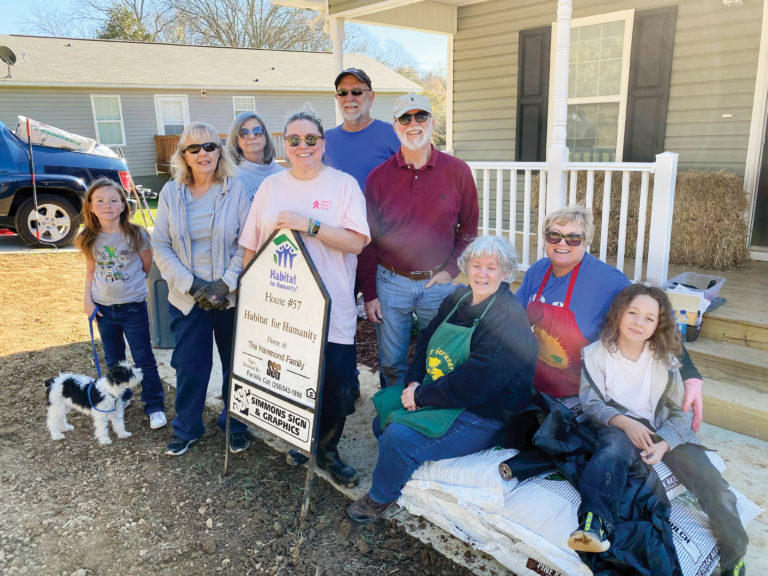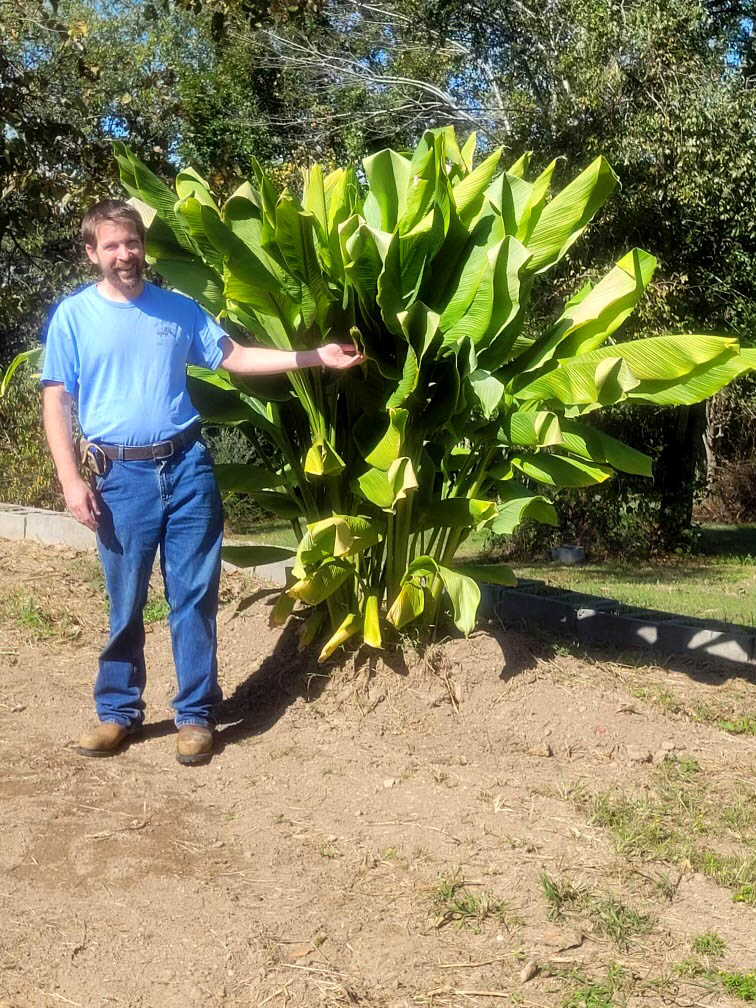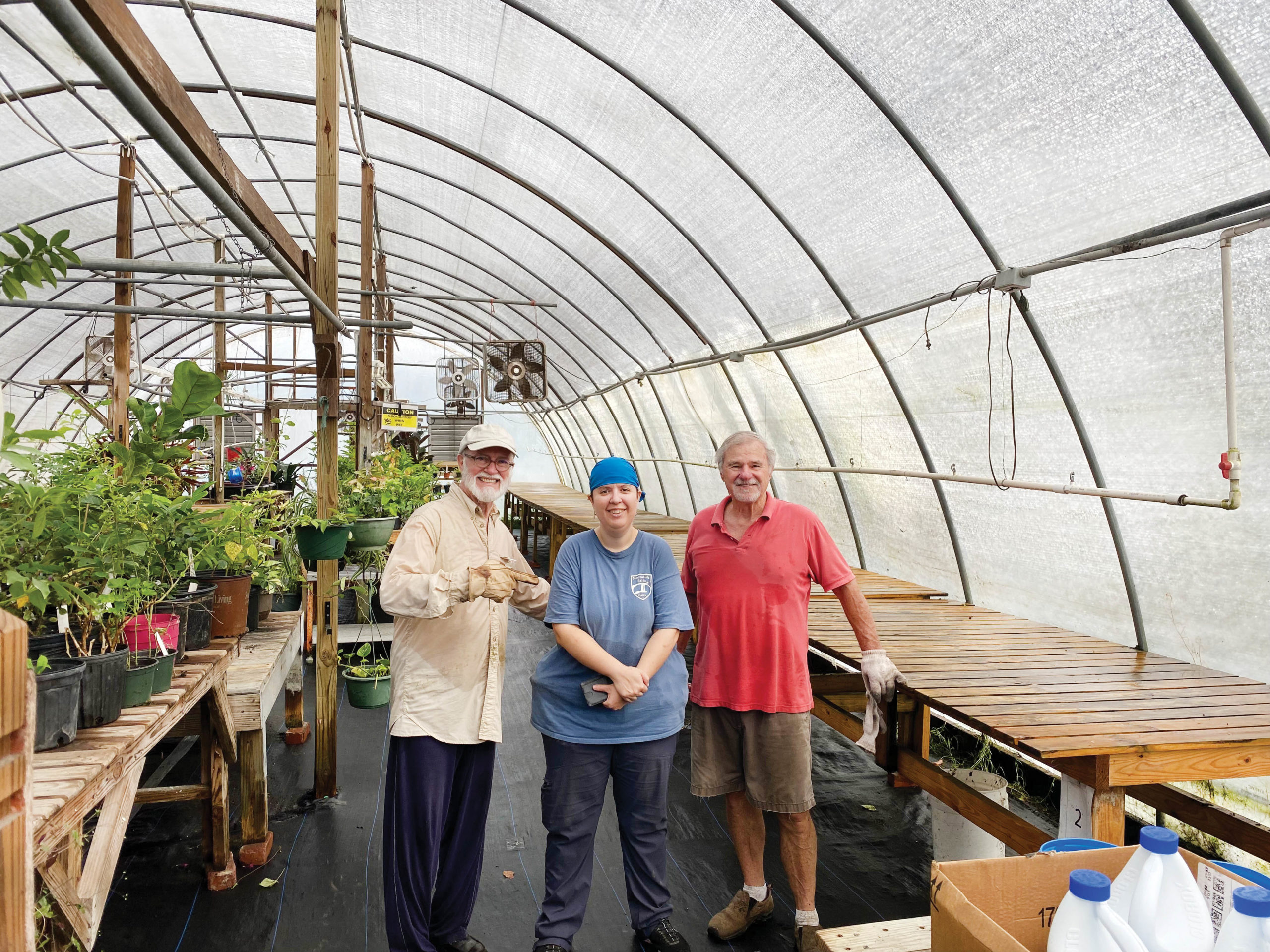Etowah County Master Gardeners volunteers landscape a Habitat For Humanity House. Photo courtesy of Regina Ford.
By Katie Bohannon, News Editor
While the phrase “Master Gardener” might evoke images of flourishing botanical beauties, pristine, lush lawns with rows of blossoming flowers or award-winning vegetables at county fairs, a group in Etowah County is proving that sowing seeds of service does not require a green thumb.
The Etowah County Master Gardener Program is a branch of the Alabama Extension Master Gardener Volunteer Program, which falls underneath the umbrella of the Alabama Cooperative Extension System. The Alabama Cooperative Extension System is the main outreach and engagement organization for three land grand universities: Alabama A&M University, Auburn University and Tuskegee University. Supported by Regional Extension Agents statewide, housed in extension offices located in Alabama’s 67 counties, these universities, agents and volunteers strive to promote research-based programming, accessible materials and educational activities that are relevant and reliable, benefitting communities.
Regional Extension Offices assist Alabamians in numerous subject matters, providing indispensable information in areas such as agriculture, forestry, natural resources, alongside economic, community and youth development. All Master Gardeners throughout the state represent their corresponding Extension Offices as educational resources for their communities.
As a self-funded, 501 (c)(3) non-profit organization, The Etowah County Master Gardeners Association (ECMGA) hosts two opportunities per year in the spring and fall to welcome interns (and eventual Master Gardeners) into the program. In both the spring and fall, interns complete 12 weeks of classes, training them in a plethora of topics rooted in horticulture. Interns receive a copy of the Alabama Master Gardener Training Handbook that corresponds with each lesson, a 600-plus page guide containing the most up-to-date research-based information. Likewise, interns receive a free soil test and learn how to interpret its results. As the base substance for growing healthy plants and trees, information regarding soil proves an invaluable gem in gardening.
While in the past ECMGA interns learned in a traditional face-to-face classroom setting, the program now offers participants the choice between virtual and in-person courses. Those with health concerns due to COVID-19 or schedule conflicts due to their professions can experience all Master Gardener courses at their convenience, reviewing the presentations through recorded Zoom classes.
The program’s implementation of Zoom classes unlocks a wealth of wisdom in guest speakers featured from class to class. Interns will gleam a personal perspective from their Master Gardener predecessors while learning from exemplary experts in various fields. From 9 a.m. until noon on Thursdays beginning in February 2022, Etowah County’s Regional Extension Agent Brian Brown will facilitate classes. Following a lunch break, interns will reconvene for a hands-on opportunity, applying the lesson to a physical project during the afternoon.
Through the program, interns receive 50 hours of instruction in gardening practices and pest control, conducting another 50 hours of approved volunteer service to achieve their Master Gardener certification. That certification earned a top spot on former ECMGA treasurer and current president Regina Ford’s plan for retirement, cultivating a new and rewarding chapter in her life.
Ford’s love for gardening sprouted from a heritage enriched with horticulture. Ford spent her childhood summers soaking up wisdom from her grandparents, who owned and operated a large farm. While her grandfather tended to their garden, her grandmother – who Ford considers an economist before dictionaries printed the word – transformed the produce into products. A wealth of knowledge, Ford’s grandmother could determine exactly how many green beans were needed to can for three families to eat them twice a week.
The farm’s influence stretched wider than Ford’s family, representing an entity that affected an entire community. Ford’s grandfather worked for Tro-Fe dairy for many years, often hiring young men to work his farm during the summers. Their name was a beloved and familiar household conversation, with her grandparents earning a wave from residents frequently recognizing them. The pair even raised cows, pigs and 20,000 broiler chickens for companies to place in grocery stores.
“I grew up in that kind of environment that [promoted] farming was our future,” said Ford, joking she was ‘genetically predisposed’ to farming. “If we’d had a pandemic when I was growing up, we would not have skipped a beat. Everything we had came from the land.”
Ford discussed a booming resurgence of individuals interested in winding back the clock, investing in a more self-sustainable lifestyle. Rather than rely on supermarkets or restaurants for meals, more and more people are opting for a self-sustaining homestead and learning how to provide for themselves. From grand working farms akin to Ford’s predecessors to small backyard gardens housing tomatoes and peppers, horticulturists with all levels of expertise are budding in communities nationwide.
That intrigue – and the passion that fuels it – represent the main motivation for master gardeners throughout the state. With an emphasis on fostering education, encouraging gardeners with zero to years of experience alike to join, the mission of the Alabama Master Gardener Program is “to train selected volunteers in the subjects of horticulture, entomology, plant pathology and soils.”
Through these volunteers, Alabama Master Gardeners strive to expand Extension Office capability to disseminate research-based information, partner with Extension Agents to develop and deliver community education programs and maintain existing Extension partnerships with all master gardeners at the local and state level. Here in Etowah County, the seeds Master Gardeners have planted flourish, the fruits of their labor blossoming into phenomenal illustrations of service.
The Etowah County Master Gardeners Association supports several established organizations whose efforts aid others each day. ECMGA regularly invites groups of adults experiencing disabilities from the Snellgrove Civitan Center to learn the process of potting plants to take home. In addition to volunteering at Noccalula Falls, gifting local 4-H groups with yearly grants, and generating two annual horticulture scholarships, members nourish Habitat For Humanity’s mission to strengthen families and provide them with essential housing through their contributions in landscape design and plant selection. A team of seasoned Master Gardeners arrive at each home, collaborating with one another to beautify the land and develop yards.
In 2021, ECMGA rejuvenated a garden at Darden Rehabilitation Center in Gadsden, which was dedicated to a retiring employee. The members salvaged plants, fostered new growth and revitalized the garden’s trellis for multiple weekends, transforming the space into a self-sufficient oasis with a complete irrigation system. Ford noted that this project served a dual purpose, reiterating the program’s emphasis on education through its irrigation workshop, which not only affected Darden Rehab’s garden but taught volunteers how to implement a similar setup at their homes.
Ford outlined two additional projects already on ECMGA’s 2022 calendar: The Gadsden Public Library and The Love Center Family Shelter. At the library, ECMGA plans to enhance the landscaping underneath the sign, creating a teaching Alabama native plant garden with corresponding labels, educating patrons on numerous plant species thriving in the rich and diverse soils of the Heart of Dixie. At The Love Center, Ford detailed the design for four raised bed gardens – each representing a different season – so those at the shelter can cultivate produce year-round.
“There is actually a lot of research about the field of horticulture therapy,” said Ford, who hopes the project at The Love Center ministers a sense of comfort, as an outlet for those involved. “Getting your hands in the dirt and seeing something grow is very healing.”
As ECMGA fosters positive change throughout its community, its influence propagates benefits for its own members as well. Ford shared that companionship among those individuals who possess the same collective passion remains a major element program members enjoy most.
“Becoming a Master Gardener gives you an opportunity to connect with other people with like interests,” said Ford, who surveyed the most recent class, asking them why they chose to participate. “Overwhelmingly, for that question, the response was friendships. When you work or have young children, you’re involved with other parents or your job is somewhat of a social outlet. When you retire, your social circle gets smaller. One of the biggest benefits [to ECMGA] is creating new friendships and working together to make your community a better place – with those who have the same vision. It keeps your mind sharp and keeps you active, both physically and mentally.”
Ford illustrated her vision for the program, detailing her hope for all involved with Etowah County Master Gardeners.
“I hope members feel a sense of importance that they’re making a difference, in their lives and someone else’s,” said Ford. “Gardening is giving back; it’s teaching. It’s seeing someone that comes into the program not knowing anything, but with a desire to learn, and working with that person seeing them develop into a full-fledged master gardener. All of a sudden, you have a plant sale and look over and they’re carrying on an in-depth conversation with someone about propagating a hydrangea…when that person first got here, they didn’t know the difference between a hydrangea and a tomato plant.”
“That’s very fulfilling to me to have that opportunity…not just to see a plant grow, but to see people grow. The Master Gardener program provides that opportunity – to learn something new, to make new friends and give something back to your community in the process. It’s never too late to learn something new.”
Spring Master Gardener Intern registration closes on January 23 and classes begin February 3. Participation in the program costs $200. The ECMGA meets on the first Thursday of each month at 10 a.m. in the Lena Martin Room at the Gadsden Public Library. All meetings are open to the public. For more information on the program, contact Regina Ford at 256-490-4996 or jidge@att.net or Brian Brown at brownbw@auburn.edu or 256-558-8129.







